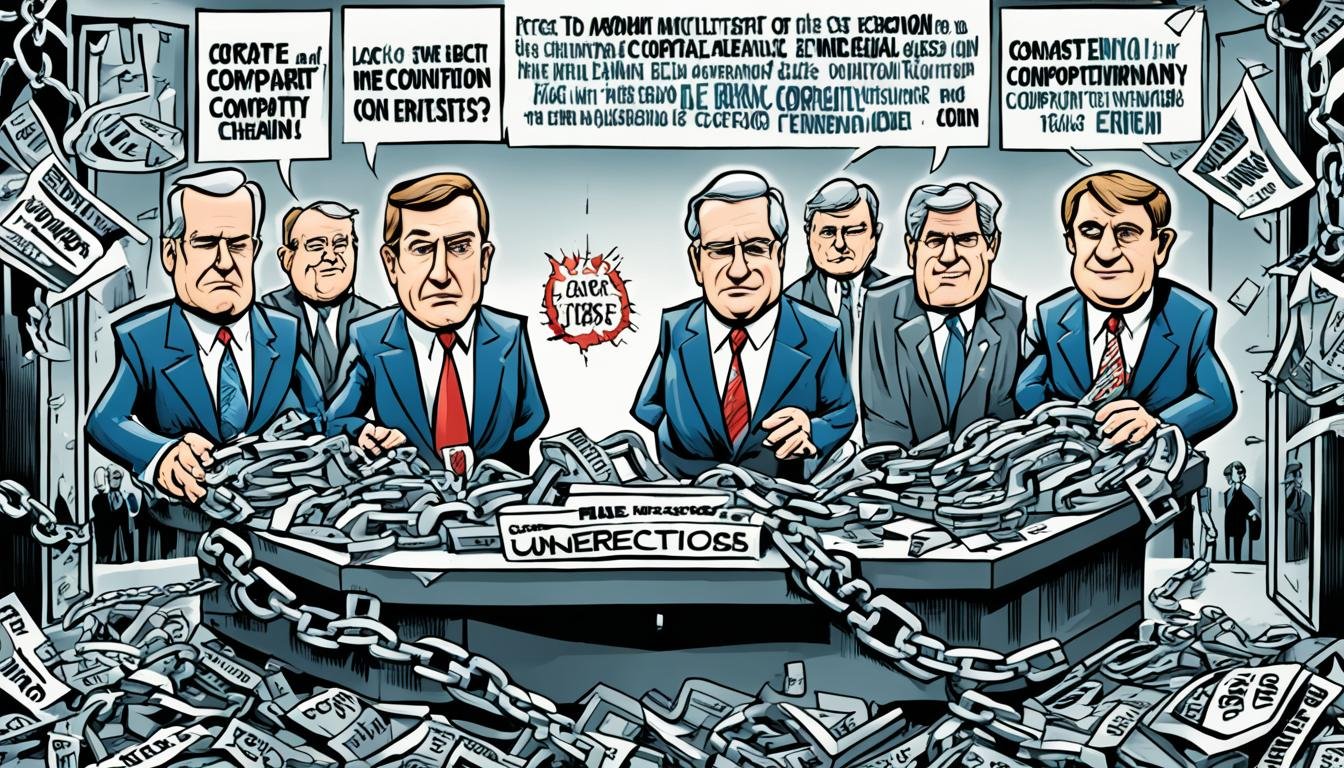Enron Case Study: Lessons in Corporate Governance and Ethics
The Enron scandal was a highly publicized corporate collapse that sent shockwaves throughout the business world. The case study of Enron provides valuable insights into the importance of corporate governance and ethics in maintaining the trust of stakeholders and ensuring the long-term sustainability of a company.
Key Takeaways:
- The Enron scandal exposed the need for reforms in accounting and corporate governance.
- Conflicts of interest, lack of board oversight, and management’s lack of truthfulness were key factors in Enron’s collapse.
- Ethical leadership, transparency, and accountability are crucial for effective corporate governance.
- Enron’s collapse had a significant impact on investor confidence in the new economy.
- Reforming executive compensation and enhancing director vigilance are essential for restoring credibility in the wake of a scandal.
Causes of the Enron Collapse
The Enron collapse was a devastating event that reverberated throughout the business world. It exposed several underlying issues that contributed to the downfall of this once-prominent energy company. These causes included:
- Conflicts of interest: One of the main factors behind the Enron collapse was the presence of conflicts of interest. Arthur Andersen, the accounting firm responsible for auditing Enron’s financial statements, also provided consulting services to the company. This dual role created a conflict of interest, as Arthur Andersen had a financial incentive to overlook or downplay any irregularities in Enron’s financial reporting.
- Lack of attention from the Enron board of directors: Another crucial aspect that contributed to the collapse was the lack of attention from the Enron board of directors. They failed to adequately oversee and challenge the decisions made by Enron’s management team. This absence of vigilant oversight allowed misleading financial practices to go unnoticed and unchecked.
- Management’s deception: Management at Enron played a pivotal role in the company’s downfall. Executives, including CEO Jeffrey Skilling, engaged in widespread deceit to inflate Enron’s financial performance and conceal mounting debt. They misled investors, employees, and regulators by manipulating Enron’s financial statements and creating hidden off-books financial entities.
The toxic culture within Enron also played a significant role in its collapse. The company fostered an environment where senior executives prioritized their personal reputations and compensation over the well-being of the organization. This focus on short-term gains and personal profit ultimately led to the erosion of Enron’s integrity and the destruction of shareholder value.
“The primary cause of the Enron collapse was the toxic culture within the company, where senior executives prioritized their reputations and compensation over the company’s well-being.”
Addressing the causes of the Enron collapse is crucial to prevent similar corporate failures in the future. By implementing robust corporate governance practices, ensuring independence in auditing, and fostering a culture of transparency and accountability, organizations can mitigate the risks associated with conflicts of interest, inadequate board oversight, and management deceit.
Recommended Reading:
- Robert A. G. Monks and Nell Minow’s book Corporate Governance: Systemic Failures and Lessons Learned provides a comprehensive analysis of the Enron collapse and its implications for corporate governance.
- In Bethany McLean and Peter Elkind’s book The Smartest Guys in the Room: The Amazing Rise and Scandalous Fall of Enron, they delve into the intricate details of Enron’s downfall and shed light on the individuals and factors involved.
Failure to Protect Employees and Investors
The Enron board of directors failed to prioritize the protection of employees and investors, exemplifying a prevalent issue in corporate governance. In the United States, directors often neglect their responsibility to represent employees’ interests, focusing solely on shareholder concerns.
This narrow focus on shareholder value resulted in the Enron board’s negligence towards the employees, who were also shareholders. Consequently, these employees suffered significant financial losses, including their retirement savings, and experienced job uncertainty.
The Enron case underscores the importance of incorporating employee protection and representation into corporate governance practices. Companies must recognize that their employees are vital stakeholders who contribute to the success and sustainability of the organization.
“Employees are not just cogs in the machine; they are individuals with a stake in the company’s performance and future.”
To promote employee protection and shareholder representation, boards of directors must broaden their perspectives and consider the impact of their decisions on all stakeholders. This approach fosters a more inclusive and balanced governance framework, ensuring that the interests of both employees and shareholders are taken into account.
By actively valuing and safeguarding the well-being of employees, companies can establish a culture of trust, loyalty, and commitment, ultimately contributing to long-term organizational success.
Lack of Accountability for Skilling, Lay, and Fastow
Enron executives Jeffrey Skilling, Kenneth Lay, and Andrew Fastow evaded accountability due to the company’s profitable image and rising stock prices. The board of directors and the investment community failed to question their actions, enabling their misconduct to persist.
Jeffrey Skilling, as the CEO, played a key role in creating the toxic culture within Enron where unethical practices thrived. Despite red flags raised by a few analysts, Skilling’s reputation as a visionary leader overshadowed concerns regarding the company’s financial stability.
Kenneth Lay, the founder and former chairman, was also responsible for the lack of accountability. He failed to ensure effective oversight mechanisms, allowing unchecked conflicts of interest and unethical behavior to persist.
“In the end, Kenneth Lay betrayed all those who believed in him and more in the durable values of honesty, responsibility, and integrity. He succumbed to the forbidden temptation of greed, and the results were devastating.”
Andrew Fastow, the former CFO, orchestrated the use of off-books financial entities to keep Enron’s debt hidden and bolster its financial standing. This blatant disregard for ethical conduct and conflicts of interest were allowed to continue unchecked by the board of directors.
Overall, the lack of accountability for Skilling, Lay, and Fastow stemmed from a combination of factors, including the company’s profitable image, the board’s failure to exercise proper oversight, and the investment community’s disregard for warning signs.
It is essential to examine the role of the board of directors and the investment community in Enron’s lack of accountability.
Responsibility of the Enron Board of Directors
The Enron board of directors, as the governing body responsible for overseeing the company’s actions, bears the ultimate responsibility for allowing conflicts of interest and ethical violations. Their failure to exercise due diligence and their lack of understanding of Enron’s complex financial transactions contributed to the company’s downfall.
The board’s inaction provided the executives with the freedom to engage in unethical practices and manipulate financial data. Andrew Fastow, specifically, exploited this lack of oversight to carry out fraudulent activities that benefited himself and other Enron executives.
Disregard from the Investment Community
The investment community also played a significant role in enabling the lack of accountability for Skilling, Lay, and Fastow. The rising stock prices and Enron’s reputation as an industry leader blinded many investors, analysts, and financial institutions to the underlying issues and risks associated with the company.
Despite some analysts’ warnings to stay away from Enron, their concerns were largely ignored in favor of the prevailing positive sentiment surrounding the company. The pursuit of short-term gains overshadowed the need for thorough scrutiny and caution.
Enron’s collapse serves as a powerful reminder that the accountability of executives and the responsibility of boards and the investment community are vital aspects of effective corporate governance.
Changes Needed in Corporate Governance
While corporate governance rules may not undergo significant changes, it is imperative for boards of directors to adopt proactive measures to ensure effective governance and protect the interests of shareholders. This includes paying closer attention to management behavior and the company’s financial strategies. Rather than simply approving proposals without scrutiny, boards should question management closely and demand transparency.
“It is the responsibility of the board of directors to act as a check and balance for management, ensuring that decisions are made in the best interest of the company and its stakeholders.”
Boards of directors should not only focus on the financial performance but also consider the treatment of employees, customers, and business partners. By prioritizing ethical conduct and treating stakeholders fairly, boards safeguard the long-term investment of shareholders.
Enhancing Board Accountability
One way to improve corporate governance is by establishing a culture of accountability within boards of directors. To achieve this, boards should:
- Regularly evaluate their own performance and effectiveness
- Implement mechanisms to assess the performance of senior executives
- Apply robust risk management and internal control systems
- Promote diversity and independent thinking among board members
By adopting these practices, boards become better equipped to identify potential risks, question management decisions, and uphold the values of transparency and accountability.
Building a Culture of Transparency
To foster a culture of transparency, companies should:
- Promote open communication channels between management and the board
- Encourage employees to report unethical behavior and protect whistleblowers
- Adopt clear financial reporting practices and disclosure policies
By cultivating transparency within the company, organizations minimize the risk of financial misconduct and enhance investor confidence.
Implementing Corporate Governance Reforms
In addition to internal efforts, corporate governance reforms at the legislative level can further strengthen accountability and transparency. Such reforms may include:
- Enforcing stricter regulations on conflicts of interest
- Introducing mandatory rotation of auditors
- Enhancing disclosure requirements for executive compensation
These reforms aim to address potential vulnerabilities within the corporate governance framework, ensuring that boards of directors remain vigilant and accountable.
| Current Challenges | Suggested Solutions |
|---|---|
| Boards of directors approving proposals without proper scrutiny | Encouraging boards to question management closely and demand transparency |
| Focus solely on financial performance without considering treatment of employees, customers, and business partners | Promoting ethical conduct and fairness toward stakeholders |
| Lack of board accountability | Establishing mechanisms for evaluating board performance and assessing senior executives |
| Lack of transparency within the organization | Promoting open communication channels, protecting whistleblowers, and implementing clear financial reporting practices |
| Weaknesses in the corporate governance framework | Enforcing stricter regulations on conflicts of interest, introducing auditor rotation, and enhancing disclosure requirements for executive compensation |
Impact on the New Economy
The collapse of Enron had a profound impact on the perception of the new economy. Enron was once hailed as an innovative company at the forefront of the dot-com era. However, the scandal surrounding its downfall raised serious doubts about the sustainability and credibility of the new economy. The bursting of the dot-com bubble had already instilled skepticism in investors and the public, but Enron’s demise further damaged the reputation of new economy companies.
Investors, analysts, reporters, and employees were suddenly confronted with critical questions about the business models and ethics of these companies. The Enron scandal served as a wake-up call, highlighting the potential pitfalls and risks associated with the rapid growth and unbridled enthusiasm of the dot-com era. It prompted a reevaluation of the promises and potential of the new economy, forcing stakeholders to adopt a more cautious and skeptical approach.
Amidst the fallout of Enron, the public’s trust in new economy companies was severely shaken. The scandal emphasized the need for transparency, accountability, and ethical conduct in the business world. It became evident that companies operating in the new economy needed to prioritize corporate governance and establish robust mechanisms to prevent the kind of corporate misconduct that led to Enron’s downfall.
Table: Comparative Analysis of Enron and Dot-com Companies’ Stock Performance
| Company | Stock Performance Before Enron Scandal | Stock Performance After Enron Scandal |
|---|---|---|
| Enron | Rapid Growth, High Valuations | Complete Collapse, Bankruptcy |
| Dot-com Companies | Mixed Performance, Increased Scrutiny | Market Downturn, Cautious Investors |
The table above illustrates the contrasting fates of Enron and dot-com companies in terms of stock performance. Prior to the scandal, Enron experienced rapid growth and soaring valuations. However, after the revelation of its fraudulent activities, the company’s stock plummeted, eventually leading to its bankruptcy. Dot-com companies, on the other hand, had a mixed performance prior to the scandal but faced increased scrutiny and a downturn in the market post-Enron. As a result, investors became more cautious and discerning in their assessment of new economy ventures.
The Enron scandal acted as a catalyst for introspection and reform within the new economy. It served as a stark reminder that sustainable growth and long-term success in the digital era require not only technological innovation but also sound ethical practices and a strong foundation of corporate governance.
Questioning Analysts’ Recommendations
The Enron scandal shed light on the questionable nature of analysts’ recommendations, particularly those that were overly optimistic in advising investors to “buy.” It raised concerns about potential conflicts of interest that analysts might have due to their involvement in underwriting business or the pressure to maintain a bullish outlook on the new economy.
As a result of the Enron scandal, there has been a significant increase in the scrutiny of analysts’ recommendations. Regulators and investors now pay closer attention to potential conflicts of interest that may bias analysts’ opinions, ensuring a more thorough evaluation of their credibility and reliability.
Analysts who consistently provide bullish recommendations without proper justification may face challenges in maintaining their credibility in the future. Investors are becoming more cautious and skeptical, demanding not only thorough analysis but also transparency regarding any potential conflicts of interest.
“The Enron scandal served as a wake-up call for the investment community, prompting investors, regulators, and analysts to reevaluate their assumptions and practices. It highlighted the importance of independent, unbiased analysis that places investors’ interests above any conflicts of interest.” – Financial Analyst, Jane Miller
Key Factors in Questioning Analysts’ Recommendations
- Identifying potential conflicts of interest
- Evaluating the rationale behind bullish recommendations
- Considering the track record and accuracy of past recommendations
- Assessing the independence and objectivity of the analyst
- Examining the quality and depth of research supporting the recommendations
Analysts’ Recommendations vs. Investor Due Diligence
While analysts’ recommendations can provide valuable insights, it is crucial for investors to conduct their own due diligence. Relying solely on analysts’ opinions without questioning or verifying their recommendations can lead to undesirable investment outcomes.
Investors are advised to carefully assess the underlying facts, analyze the company’s fundamentals, and consider alternative perspectives before making investment decisions. By taking an active role in evaluating potential opportunities and risks, investors can make more informed choices and navigate the financial markets effectively.
Analysts’ Recommendations: A Tool, Not an Absolute
Analysts’ recommendations can be a useful tool for investors, providing guidance and insights. However, it is essential to recognize that analysts are human and subject to biases and conflicts of interest. By exercising skepticism and conducting independent research, investors can make better-informed decisions and better manage their financial portfolios.
Post-Enron Reforms for Congress and Regulators
After the Enron scandal, it became evident that significant reforms were necessary to prevent similar corporate collapses and safeguard the interests of investors and stakeholders. The reforms initiated by Congress and regulators focused on strengthening accounting regulations, enhancing disclosure requirements, and promoting director vigilance.
To tackle the issue of conflicts of interest, accounting regulations needed revision to prohibit accounting firms from owning both auditing and consulting services. This separation would help maintain the objectivity and integrity of auditing practices, reducing the likelihood of compromised financial reporting.
Additionally, the Securities and Exchange Commission (SEC) identified the need for additional disclosure requirements to provide investors with more comprehensive and transparent information. These requirements aimed to increase accountability and prevent the manipulation of financial statements.
Regulators recognized the crucial role of directors in ensuring corporate governance effectiveness. To encourage director vigilance, tighter requirements were implemented, emphasizing the need for directors to be more actively involved in decision-making and to exercise oversight over management’s actions. Protecting whistleblowers and cultivating a culture of truthfulness and integrity were also prioritized to promote ethical conduct within organizations.
However, while legislative and regulatory reforms play a vital role, it is ultimately the attentiveness of directors and the ethical conduct of executives that create a robust corporate governance framework. The enforcement of regulations and adherence to ethical principles must be consistently pursued to prevent future corporate scandals and rebuild trust in the system.
Key Points:
- Revised accounting regulations are crucial to prevent conflicts of interest and maintain the integrity of financial reporting.
- Additional disclosure requirements by the SEC can enhance transparency and accountability.
- Tighter requirements for directors foster increased vigilance, protecting the interests of stakeholders.
- Vigilance, protection of whistleblowers, and ethical conduct are pivotal in promoting effective corporate governance.
Post-Enron Reforms at a Glance
| Reforms | Objectives |
|---|---|
| Revision of accounting regulations | To prevent conflicts of interest and enhance the credibility of financial reporting |
| Additional disclosure requirements | To increase transparency, provide investors with comprehensive information, and prevent financial manipulation |
| Tighter requirements for directors | To promote director vigilance, active involvement, and oversight |
| Protection of whistleblowers | To encourage the reporting of unethical behavior within organizations |
| Promotion of ethical conduct | To build a culture of truthfulness, integrity, and accountability in corporate governance |
Implementing these reforms marks a crucial step towards preventing corporate fraud and restoring confidence in the financial system. By strengthening accounting regulations, enhancing transparency, and promoting vigilant directorship, the lessons learned from the Enron scandal can contribute to the establishment of effective corporate governance practices.
Recovering Credibility with Investors
One of the key challenges that organizations face after a financial scandal, such as the Enron collapse, is regaining credibility with investors. To rebuild trust, companies must take proactive steps to address the issues that led to the loss of trust in the first place.
Eliminating off-books accounts is crucial in restoring faith in a company’s financial controls. These hidden accounts have been at the center of many corporate scandals, as they distort the understanding of a company’s true financial health. Organizations need to demonstrate transparency and ensure that all financial activities are accurately reported and accounted for.
Committing to upholding codes of conduct is another essential step. Companies should make a public commitment to follow ethical standards and disclose any deviations from these standards. This demonstrates a commitment to corporate governance best practices and helps rebuild trust with investors who value integrity and transparency.
Boards of directors play a critical role in recovering credibility. They must be vigilant and establish robust procedures to uncover any questionable behavior within the organization. By actively overseeing financial controls, board members can ensure that the company operates ethically and within the bounds of the law.
Adopting Best Practices in Governance
To regain investors’ trust, companies should adopt governance best practices. This includes implementing comprehensive risk management frameworks, conducting independent audits, and providing regular and transparent financial reporting.
Establishing a strong and independent audit committee is crucial for effective financial controls. This committee should closely monitor the company’s financial statements, internal controls, and compliance with regulations. By conducting thorough audits, companies can detect and rectify any irregularities, demonstrating their commitment to transparency and accuracy.
Moreover, companies must foster a culture of accountability and ethical behavior from top to bottom. This involves clearly defining roles and responsibilities, implementing strong internal controls, and promoting open communication channels. By adopting these governance best practices, companies can create an environment that fosters trust and confidence among investors.
Rebuilding Investor Confidence
Recovering credibility with investors is a gradual process that requires consistent effort and a commitment to change. By implementing financial controls, eliminating off-books accounts, and adopting governance best practices, companies can rebuild investor confidence and restore their reputation.
It is vital for businesses to understand that regaining trust takes time and requires a long-term commitment to ethical conduct and effective governance. Only by demonstrating transparency, accountability, and integrity in their actions can companies hope to regain the trust and confidence of investors.
Reforming Executive Compensation
The stock option system is not inherently problematic, but it can become a breeding ground for manipulation and unethical practices when executive compensation becomes excessive. To promote fairness and ethical conduct, it is crucial to focus on reforming compensation practices within organizations. By aligning executive salaries with those of regular employees and establishing a more balanced ratio, companies can prevent misconduct and ensure a stronger foundation of corporate integrity.
One of the main issues with excessive executive compensation is the potential for manipulation of financial accounts and stock prices. When executives are incentivized solely by monetary gains, they may resort to unethical practices such as inflating financial numbers to meet performance targets and artificially boosting stock prices. This behavior not only deceives investors but also undermines the trust and stability of the entire organization.
To address these challenges, companies need to adopt a more holistic approach to compensation. Rather than solely focusing on stock options and extravagant bonuses, organizations should consider a broader range of factors. These may include metrics that measure long-term sustainable growth, employee and customer satisfaction, and social responsibility.
By linking executive compensation to these broader factors, companies can ensure that their leaders are incentivized to prioritize the organization’s long-term success and the well-being of all stakeholders. This approach creates a more balanced compensation system that encourages ethical behavior and discourages short-term thinking.
Additionally, transparency is vital in the reform of executive compensation practices. Establishing clear guidelines and disclosure requirements for compensation packages can provide shareholders and other stakeholders with greater visibility into how compensation decisions are made. This transparency fosters trust and accountability within the organization.
Table: Comparing Traditional and Reformed Compensation Practices
| Traditional Compensation Practices | Reformed Compensation Practices |
|---|---|
| Heavy reliance on stock options and extravagant bonuses | Consideration of long-term sustainable growth and holistic performance metrics |
| Focus on short-term gains | Emphasis on long-term success and stakeholder well-being |
| Lack of transparency in compensation decision-making | Clear guidelines and disclosure requirements for compensation packages |
Through these reforms, organizations can create a culture of fairness, accountability, and responsible corporate governance. By aligning executive compensation with the salaries of regular employees and implementing a more holistic approach to performance evaluation, companies can promote ethical conduct and restore trust in the executive compensation system.
Conclusion
The Enron scandal left an indelible mark on the corporate world, serving as a stark reminder of the importance of ethical leadership and effective governance. It shattered the illusion of invincibility surrounding one of America’s largest corporations, exposing the devastating consequences of unchecked power and corporate irresponsibility.
Enron’s legacy lies not only in its financial collapse but also in the lessons it imparted to the business community. The need for board independence and vigilance cannot be overstated. Boards must possess the courage to challenge management, spot red flags, and prioritize the long-term well-being of the organization over personal interests.
Furthermore, Enron underscored the significance of corporate culture and the detrimental effects of a toxic environment. Companies must foster a culture of transparency, accountability, and ethical behavior. By doing so, they can safeguard against ethical lapses and ensure the trust and confidence of stakeholders.
In today’s business landscape, Enron’s legacy remains relevant as a cautionary tale. It serves as a constant reminder of the criticality of corporate responsibility and effective governance. By embracing these principles, companies can not only prevent similar corporate catastrophes but also build sustainable organizations that contribute positively to society.








